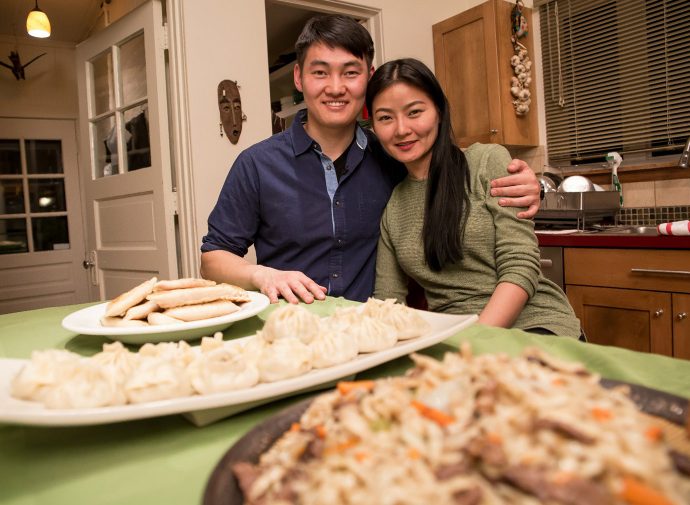When I was a kid, especially in the countryside, all we did was: you wake up in the morning, you start taking care of your animals or your vegetables. How can I say it? You just touch everything. So, I think that’s the secret of the taste of this food. It’s not like you just buy it from the store and cook it. It’s part of you, it’s your heart.
Telmen Tumenulcii
I met Telmen and Anna at one of the many urban nail salons that employs squads of immigrants from Vietnam, Korea, or more recently, Mongolia. Everyone there wears a nametag, and the labels read like the cast of characters in a romance novel…. Audrey, April, Crystal. The atmosphere is efficient, but friends often go together. They book an appointment for neighboring massage chairs, sit with feet in enamel tubs filled with warm soapy water and catch up on the latest. You also hear the murmur of women’s voices speaking in Vietnamese, Korean and Mongolian as the Audreys and Aprils and Crystals chat with each other between clients. There is a big screen TV on almost all the time, no sound just subtitles, alternating between news channels, quiz shows and the soaps. The nail salons used to be almost exclusively a women’s province, but now there are lots of guys getting manicures and pedicures and men working as nail technicians.
I’m always tempted by the lunch snacks the employees heat up in the ubiquitous microwaves…the aroma of beef and shrimp and rice, soy sauce, curry, ginger and garlic drive me crazy. I usually try and strike up a conversation about ingredients and markets and restaurants serving food from home. Over the years, I’ve picked up a lot of good tips and recipes this way.
One fortuitous Friday, I’m at Nail Palette with my niece Rachel, settled into neighboring massage chairs, reverently talking about food and meals we are planning. Telmen (nametag “Paul”) is giving Rachel a pedicure and our conversation ends up all about dinner. Something about his detailed instructions for Mongolian beef dumplings and his enthusiasm for cooking left me feeling that I had to eat them, and maybe even learn to make them. I thought I invited Telmen and his girlfriend Anna to my kitchen to teach me how. This turned out to be merely a cover story for a lesson in the importance of possessing a spiritual connection to food.
Telmen’s family is from a forested region in northern Mongolia while Anna’s people are nomads from the forbidding Gobi Desert in the south. The couple met and fell in love while attending dental school in the Mongolian capital, Ulaanbaatar. After working with colleagues trained in the West, they began to feel that the education they were receiving in Mongolia was inferior. As an ambitious young couple, this was absolutely unacceptable. They would have to move to the United States.
While teaching me to make buuz, bansh and huushuur, three different styles of dumplings, I hear more of their story. They came to Chicago five years ago, with only 300 dollars and limited English but determined to take up their dental studies here. Anna was a year ahead in school and had already passed her board exams in Mongolia. They worked at nail salons to support themselves and Anna prepared to take the American dental school exams. In 2016, She was accepted into the third year of studies at UCLA, with only her clinical work left to complete. So this past May they left Chicago to move to Los Angeles. They took just their car, their documents, clothes, and a parakeet, anticipating a fresh start in a new city.
Anna started clinical training at UCLA in June; Telmen will apply to dental school once they have stabilized their lives in Los Angeles.
I was enthralled with the grit and optimism that they displayed in their journey, but I was also fascinated by the reciprocal relationship they described between Mongolian culture and the natural world. There is a symbiosis between people and their animals and crops. The vast distances between communities and the harshness of the environment shape that relationship. It is one based on necessity and respect. But it is the deep spirituality of the people and their respect for the natural world that profoundly affects how they think about preparing food. This spirituality, in turn, impacts the very taste of the simple ingredients they prepare.
Cooking together, sitting down to a meal almost every night, continues to be Anna and Telmen’s lifeline to Mongolian culture and to their families. Amidst all of the progress they have achieved towards their dream of living in the United States and all their anticipated success as dentists, they wonder how they will be able to maintain their spiritual connection to food in the context of this new life.

Recipes
Mongolians don’t use recipes or cookbooks. You learn the dishes from your family then, in turn, pass them on to the next generation. Here I can only share what I observed as Anna and Telmen prepared these dumplings and noodles in my kitchen, with notes scribbled and measurements hastily recorded as they worked. Families usually make dumplings together, since hundreds are needed when visitors drop to celebrate the Lunar New Year.


What an amazing story. Hard to believe these folks have travelled to far and achieved so much in such a short period of time.
What a great story, I enjoyed it very much, nice job!
Hi Lisa – just saw this and loved it. I’ve just been reading an interesting book called Black Dragon River which is the history of Mongolia/Russia – a little like “homework” but it did make me wonder about the food – gonna make those noodles soon!
Thanks Judith. I’m so glad you enjoyed it. Cheers, Lisa